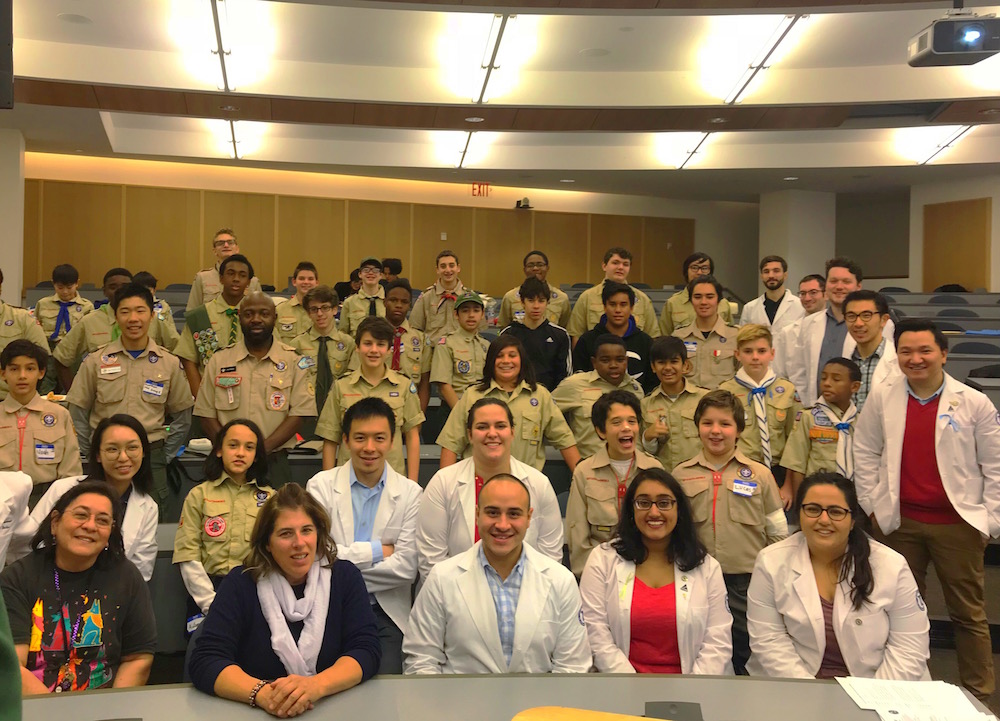“This Is Why We’re Becoming Doctors”
Members of Sigma Sigma Phi Discuss Community Service

For members of TouroCOM Harlem’s Sigma Sigma Phi (SSP) Honors Fraternity, volunteering and helping their community is an integral part of osteopathic medical school.
“Community service is a way to bring us back to the reason we became doctors,” explained Sigma Sigma Phi Honors Fraternity Executive board (e-board) President Khanh Truong. “This is why we’re here in Harlem; this is why we’re in TouroCOM and why we’re becoming doctors.”
The society is composed of four members of the e-board, Khanh Truong, Jason Kondrat, Julie Lavalliere, and Danielle Sherlock, and close to 30 active members from the class of 2020. To be a part of the society, students must maintain a 3.0 GPA and commit to volunteering for 10 hours for community service and 10 hours in helping or tutoring other students per semester.
“It does take a lot of time,” laughed OMS II Khanh Truong. “But we want to give back.”
Since their election in March of 2017, the e-board has organized four large activities: organizing a free community health fair; teaching CPR and first-aid to boy scouts; running a cooking fundraiser to raise money for charity; and bringing in a sign-language interpreter to teach the students sign-language medical terminology. Altogether, the society has volunteered more than 1100 hours in community service and 1000 hours in helping their fellow students.
In addition, members of the society volunteer each Friday to help run the food pantry at Corinthian Baptist Church on 116th street, near the school.
“We bag groceries and hand them out to the community,” said OMS II Maxwell Horowitz, a member of the fraternity. “SSP allows us to take our leadership skills and apply them during our medical studies.”
To fulfill the ten-hour requirement in helping other students, members of the society also tutor first year students or master’s candidates.
“We ran a mock practical for anatomy because there’s so much anxiety about this exam,” said Truong.
In the society’s largest event, the group partnered with TouroCOM’s American Medical Association-Medical Student Section and Touro College of Pharmacy and transformed their shared building into a health fair, complete with tests for blood pressure and blood glucose tests, HIV screenings, prescription medication consultations, bone density screenings and BMI screenings
“We are part of the Harlem community,” said Simrat Veera, Chair of the Outreach sub-committee within SSP. “Harlem is very open to community events and the population might be similar to the one we’ll end up serving as medical professionals. It’s nice to get to know what their priorities and their needs are one-on-one.”
Horowitz said the health fair gave students an immediate look at the medical issues communities face.
“We always trying to help others and learning about the particular adversities a community faces allows us to provide them with better medical care,” he said.
In November, the society collaborated with the American College of Osteopathic Pediatricians Student Organization at TouroCOM to host 50 boy scouts who were eager to earn their first-aid merit badge.
“Not only did working with the boy scouts encourage us to work on talking to a younger age group, but we also learned how to engage with parents—that’s sort of an edge for when we do our pediatric rotations,” said Truong.
Horowitz, who had spent two months in New Orleans teaching children healthy cooking habits after Katrina, said his favorite event was the Delish-a-Dish where the society raised $800 for Corbin’s Legacy, an organization that provides elementary school children with lunch, in an Iron Chef-like competition. (Their secret ingredient in the Iron-Chef cooking event was instant ramen.)
Veera said her favorite event was having a sign-language instructor visit the school to teach about deaf culture and communicating with differently-abled patients. The year before, the society collaborated with the Latin Medical Student Association to teach the students Spanish medical terminology.
Though new elections were held in early February, the board completed their term with another activity filled with heart: selling candygrams to raise money for heart surgeries for Vietnamese children.
“The average heart surgery in Vietnam costs $1000,” said Veera. “We’ve raised more than $1200 to donate.”

